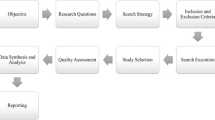Abstract
In this article we report on our experience with teaching differences that exist between relational and non-relational data models. We present results of an evaluation of a practical course in which students are assigned 15 queries within 6 tasks that they execute on four different database systems. The pedagogical aim of this course was to show conceptual differences between data models, difficulties that can occur when trying to formulate queries in different query languages, as well as specific system behavior. We evaluate the practical course based on a questionnaire that recorded the students’ performance on each task for each DB system.




Similar content being viewed by others
References
Council of the European Union (2017) Council recommendation, of 22 May 2017, on the European Qualifications Framework for Lifelong Learning and Repealing the recommendation of the European Parliament and of the Council of 23 April 2008 on the establishment of the European Qualifications Framework for Lifelong Learning. Off J Eur Union 189:15–28
Fowler B, Godin J, Geddy M (2016) Teaching case: introduction to noSQL in a traditional database course. J Inf Syst Educ 27(2):99
Gessert F, Wingerath W, Friedrich S, Ritter N (2017) NoSQL database systems: a survey and decision guidance. Comput Sci Res Dev 32(3–4):353–365. https://doi.org/10.1007/s00450-016-0334-3
Gessert F, Wingerath W, Ritter N (2017) Scalable data management: an in-depth tutorial on noSQL data stores. In: Mitschang B, Ritter N, Schwarz H, Klettke M, Thor A, Kopp O, Wieland M (eds) Datenbanksysteme für Business, Technologie und Web (BTW 2017), 17. Fachtagung des GI-Fachbereichs “Datenbanken und Informationssysteme” (DBIS), 6.–10. März 2017, Stuttgart, Germany. Workshopband, LNI, vol P‑266, pp 399–402 (https://dl.gi.de/20.500.12116/937)
Kim S (2020) Seamless integration of noSQL class into the database curriculum. In: Giannakos MN, Sindre G, Luxton-Reilly A, Divitini M (eds) Proceedings of the 2020 ACM Conference on Innovation and Technology in Computer Science Education, ITiCSE 2020, Trondheim, Norway, June 15-19, 2020, pp 314–320 https://doi.org/10.1145/3341525.3387399
Kleppmann M (2016) Designing data-intensive applications: the big ideas behind reliable, scalable, and maintainable systems. O’Reilly, Heidelberg
Klimt B, Yang Y (2004) Introducing the Enron corpus. In: CEAS 2004 - First Conference on Email and Anti-Spam, July 30-31, 2004, Mountain View, California, USA (http://www.ceas.cc/papers-2004/168.pdf)
Wiese L (2015) Advanced data management, for SQL, noSQL, cloud and distributed databases. De Gruyter, Berlin
Acknowledgements
This course was further supported by Nasr Kasrin, Stefan Schwarz, Tim Waage, Ingmar Wiese, and many student teaching assistants. We’d further like to thank all students for their participation in the evaluation and their valuable feedback.
Author information
Authors and Affiliations
Corresponding author
Rights and permissions
About this article
Cite this article
Wiese, L., Benabbas, A., Elmamooz, G. et al. One DB Does Not Fit It All: Teaching the Differences in Advanced Database Systems. Datenbank Spektrum 21, 83–89 (2021). https://doi.org/10.1007/s13222-021-00371-1
Received:
Revised:
Accepted:
Published:
Issue Date:
DOI: https://doi.org/10.1007/s13222-021-00371-1




